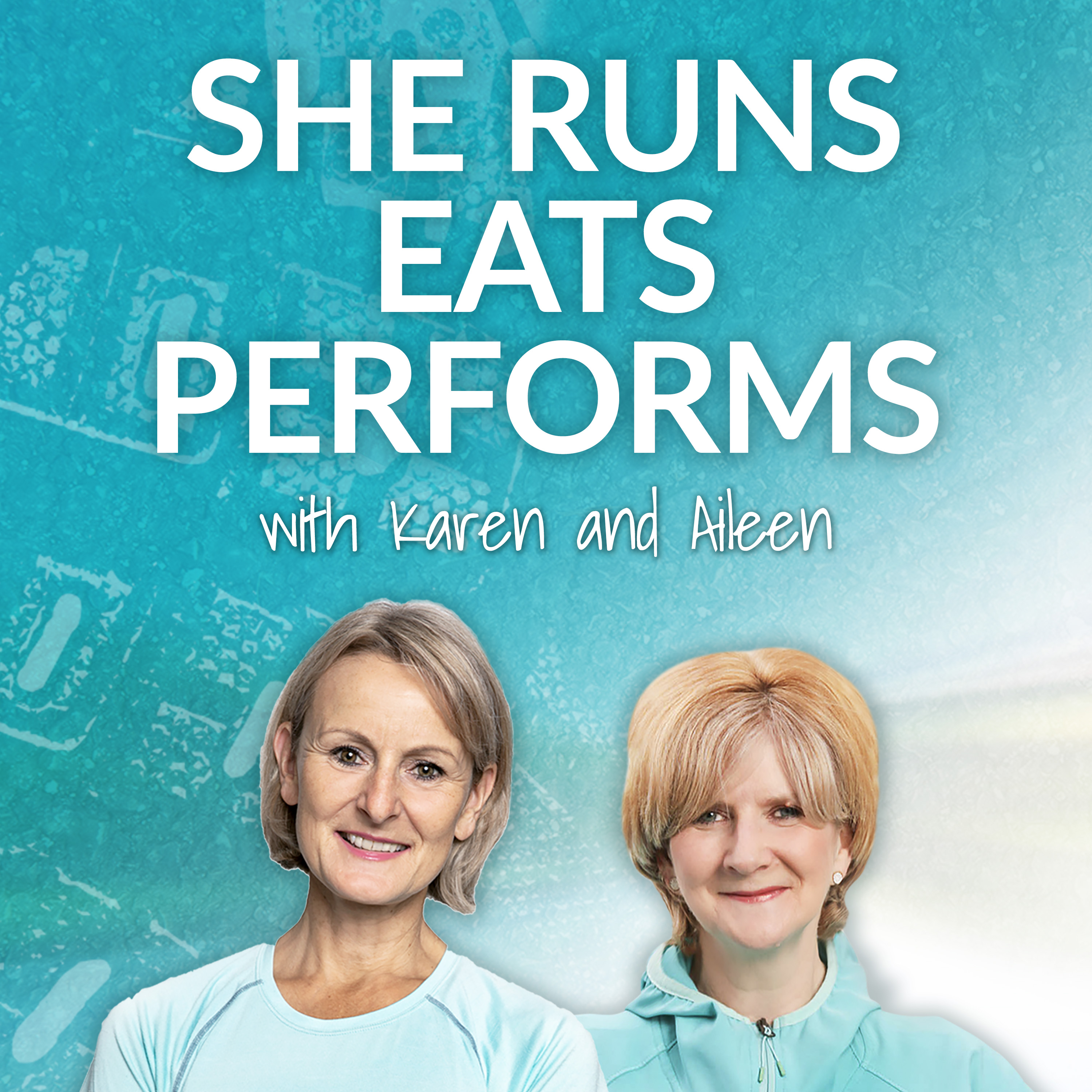Perimenopause and Performance
Perimenopause and Performance
Perimenopause is a natural life phase, however it’s one where female hormones (especially oestrogen) are fluctuating and that can lead to wide ranging symptoms which may be erratic and even dramatic.
We talk about:
- Perimenopausal challenges female runners experience and how it impacts on their running
- What is driving all of these changes in a women’s body and our recommended approach to managing peri menopause and running performance
- A focus on the impact of poor sleep and hot flushes on running performance
The good news is that regular exercise of moderate intensity appears to help minimise symptoms and alongside nutrition and lifestyle strategies will support a smooth transition through perimenopause.
Show Notes
(00:36)
We share our experiences of perimenopause.
(05:35)
What is perimenopause?
Perimenopause means "around menopause" and refers to the time during which your body makes the natural transition to menopause, marking the end of the reproductive years.
Women start perimenopause at different ages, mostly mid to late 40’s but sometimes earlier – oestrogen levels rise and fall unevenly during peri menopause leading to various symptoms
For women under 45 a diagnosis of peri menopause would usually be made based on symptoms i.e. vasomotor symptoms and irregular periods - if you are younger your doctor may check hormone levels
Signs that you may be peri menopausal:
- You may notice that your menstrual cycle becomes irregular – may lengthen or shorten, perhaps heavier flow, or you may skip a period
- You may also experience symptoms, such as hot flashes, fatigue, irritability, mind/mood symptoms, weight gain, sleep problems, low libido, aches and pains
Perimenopause may continue for a few years – different for every woman
Once you've gone through 12 consecutive months without a menstrual period, you've officially reached menopause, and the perimenopause period is over – however some of the symptoms may continue
(12:11)
We look at the perimenopausal challenges female runners experience such as:
Unexpected Weight Gain – Disturbed Sleep – Hot Flushes and Night Sweats – Unexpected Injuries and Aches & Pains, Low Energy/Fatigue/Poor Recovery, Low Mood/Irritability/Foggy Brain
One of the aspects of perimenopause is the unpredictability of the symptoms which often leads to a woman feeling out of control. I know it all feels very serious, but I believe that if you understand what is going on and a have some personal nutritional and lifestyle management strategies you can feel more empowered to guide yourself through this life stage and minimise symptoms.
(14:41)
Weight gain is common in in perimenopause - especially around the middle or developing a higher fat: muscle ratio will often this affect how we feel about ourselves/self-esteem and how we perform as a runner.
(17:30)
Women also talk a lot about ….
Disturbed sleep often related to night sweats – as we know poor sleep impacts on many aspects of health and performance – particularly the energy we require to get out on our run training sessions.
Hot flushes at any time in the day or night and even during a run training session – sudden changes in body temperature can be unpleasant, shocking, embarrassing and if you are training perhaps a distraction.
(19:18)
More frequent injuries and aches and pains and experiencing low energy and fatigue are also common in runners.
Unexpected injuries and aches and pains in muscles and joints, which could potentially lead to time out of training and races and also demotivation – there is limited research in the area of the effect of oestrogen on tendons and ligaments however it’s thought that oestrogen may have a protective effect on connective tissue and collagen and therefore declining oestrogen may potentially put us at risk of injury.
We need to seriously consider the impact of declining oestrogen on bone mineral density during perimenopause AND post-menopausal years too.
Another common concern is Low Energy, fatigue, poor recovery – so, feeling that you don’t have enough energy to complete your training – this can be attributed to many different factors e.g. poor sleep, not fuelling/eating appropriately, low nutrient status...so not just as a result of peri-menopause.
(22:35)
Low mood, mood swings, irritability, feelings of sadness, foggy brain, lack of concentration – are again likely to impact on your motivation to train and run.
Running and exercise will support you in minimising symptoms.
Studies (published in Menopause and the Journal of Physiology in 2016) back that up. One found that sedentary women (women who exercised less than three times a week) were 28 percent more likely to experience menopause symptoms than active women, and 21 percent more likely to experience hot flashes.
·In another, the women who exercised more frequently and intensely reported that the average frequency of their hot flashes dropped by more than 60 percent.
(26:59)
What’s driving all of these changes in our body? We also look at some management strategies.
- Fluctuation of oestrogen levels having wide ranging effects throughout body
- Disturbances in the thermoneutral zone leading to hot flushes, night sweats and potentially dehydration
- Food, drink and exercise triggers
- Having a holistic approach to perimenopausal management
(34:16)
Foundations of nutrition and lifestyle in place to support perimenopause
Blood sugar balance, digestion, liver health and stress are all major influences on sex hormone balance.
The most important advice is to get the basics in place:
SIMPLE STUFF – EVERYDAY HYDRATION and EVERYDAY NUTRITION and a simple SYSTEM for planning and preparation
· Drink 1.5L water every day
· Plate balance at every meal
· 30 different vegetable every week
· Set boundaries around soft drinks, caffeine and alcohol
· Managing stress
· Being consistent in your exercise
· Follow 80:20 approach
(42:04)
One of our listeners, Sally emailed us to ask if we’d cover perimenopause in an episode.
We take a look at Sally’s challenges and make some suggestions on how she may support with nutrition and lifestyle.
(53:27)
Key Take Aways
Perimenopause is the natural transition to menopause, marking the end of the reproductive years and typically happens from mid 40’s for a few years – every woman is different.
Oestrogen levels generally decline during perimenopause in an irregular fashion leading to erratic symptoms having effects on many parts of the body.
You may experience irregular periods and a variety of symptoms such as hot flashes, fatigue, irritability, mind/mood symptoms, weight gain, sleep problems, low libido, aches and pains.
Studies indicate that women who exercise regularly at a moderate intensity appear to experience less severe hormonal symptoms than non-exercising women.
Female runners who have always been fit, healthy and with a good body composition are often really surprised and sometimes shocked at the changes they are experiencing:
- Body Composition changes may affects how we feel about ourselves/self-esteem and how we perform as a runner
- Disturbed sleep often related to night sweats may impact on energy required to run and recovery and hydration status
- Hot flushes at any time in the day or night and even during a run training session –can be unpleasant, shocking, embarrassing and if you are training perhaps a distraction
- Peri-menopausal women may be at risk of injury due to the impact of declining oestrogen on collagen, connective tissue and bone density
- Low Energy and fatigue may affect performance, recovery and motivation
- Motivation to train and run may be affected by mind/mood symptoms
Women may fall into the trap of choosing pieces of advice rather than approaching this life stage holistically, there’s a tendency to look for a magic bullet.
A holistic approach to perimenopause includes personalised nutrition, optimising liver, digestion, blood sugar balance, managing stress and lifestyle.
Ending on a positive note, all of the symptoms we have mentioned may be naturally supported and minimised so that you may transition happily through this life stage and as runners we are really helping ourselves!
Related Episodes:
Resistant Weight Loss for Runners
Nutrition Basics for ALL Runners
Blood Sugar Balance for Female Runners
Disclaimer:
The suggestions we make during this episode are for guidance and
advice only, and are not a substitute for medical advice or treatment.
If you have any concerns regarding your health, please contact
your healthcare professional for advice as soon as possible.
Aileen Smith and Karen Campbell met at as nutrition students (Institute for Optimum Nutrition, London) and became lifelong friends and nutritional buddies! Both have a love of running and a passion for nutrition, delicious food and healthy living.
Together they host RUNNERS HEALTH HUB. A place for like-minded runners who are looking for simple ways to support running performance, energy, endurance, and general great health.
We are excited to be able to share our expertise, experience and short cuts with you. We hope you'll join us again. If you'd like to know more about us and She Runs Eats Performs please check out our TRAILER.
If you're ready to make learn more about how you may introduce easy nutrition into your running and training plan join our Easy Nutrition For Healthy Runners Online Programme for short videos, recipes, downloads and LIVE training and Q&A.
As a THANK YOU to you as one of our valued listeners, we have a special offer for you use COUPON CODE POD to get 33% discount off the full price which brings the price to £199.
If you’d like help from Karen and Aileen to design a personalised sports nutrition plan for your running - please contact them at hello@runnershealthhub.com
Happy Running!
Aileen and Karen

